 He’s not exactly the kind of person you’d expect to be able to infiltrate, or even be interested in infiltrating the underground world of Anonymous, but filmmaker Brian Knappenberger did just that, with his documentary We Are Legion: The Story Of The Hactivists. And though the players in that world remain secretive and necessarily so in the film with no big reveal, Knappenberger—who more typically probes a very different masked realm of the One Percenters in projects like Bloomberg Television’s Game Changers—audiences are provided with a rare glimpse into hacktivist culture more likely demonized in the conventional media. During this conversation with the director, he describes getting in touch with his inner gumshoe to scrutinize members of Anonymous, both indicted and otherwise. And what it all has to do Scientology, epilepsy, hide and seek pranksters versus political activists, and soccer moms.
He’s not exactly the kind of person you’d expect to be able to infiltrate, or even be interested in infiltrating the underground world of Anonymous, but filmmaker Brian Knappenberger did just that, with his documentary We Are Legion: The Story Of The Hactivists. And though the players in that world remain secretive and necessarily so in the film with no big reveal, Knappenberger—who more typically probes a very different masked realm of the One Percenters in projects like Bloomberg Television’s Game Changers—audiences are provided with a rare glimpse into hacktivist culture more likely demonized in the conventional media. During this conversation with the director, he describes getting in touch with his inner gumshoe to scrutinize members of Anonymous, both indicted and otherwise. And what it all has to do Scientology, epilepsy, hide and seek pranksters versus political activists, and soccer moms.
1. How do you go about making a movie about a world that is so secretive and underground, and understandably so?
Basically, we just started kind of hanging out at those places on the Internet where Anonymous hangs out. A lot of them communicate on Twitter and other kinds of things like that. So we just started talking to them that way.
2. Now for purposes of identification related to making this documentary, are you or have you ever been a hacktivist?
Have I? No! I’ve worked as a journalist for the Discovery Channel, National Geographic and PBS Frontline. And I just finished a 23 part series for Bloomberg Television, called Game Changers. You know, I’m very much coming at this as a journalist. So yeah, that’s my perspective. I’ve never worn a Guy Fawkes mask! In my life. So I’m very much not a secret Anon.
3. How do you see the Anonymous hacktivist culture as emerging from this moment in time?
That’s a really interesting question. And that’s one of the things we try to do with this film. But Anonymous is a lot about civil disobedience. And comparing the acts they do now, with other acts of civil disobedience in history, is really interesting. And essentially what we tend to say in the film, is that they’ve redefined civil disobedience for the digital age. Like they do things such as denial of service attacks, which they define as a kind of virtual sit-in. Just like in the ’60s that would protest a war. But these are things that are happening online, in order to make a political point. So I think the question of how they fit into the big history books, in hacker history and technical history, and just plain civil disobedience history, is a really vibrant area for study. And one of the big reasons why I made the film.
4. As you’ve come to know them through your movie, what do you think the hacktivists would be up to, if there were no Internet in existence?
I don’t know! It’s very hard to tell, because they are very much children of the digital age. And they’re not all children, with certainly a range of age groups. But they rise up most forcefully, when they perceive threats to online communication. And abuses of power through technical means. So what they’d be doing without the Internet, who knows! But those are the waters in which they swim.
5. Well, do you think they might have followed in the footsteps of the old school activists instead?
Yes, I do think that. Because there is a very significant part to this movement, to Anonymous and to hacktivism, that is very non-technical. They are about civil disobedience in a new world, where we all live online. But part of it is about defending traditional values, in a way. Freedom of speech is a traditional kind of value. And the right to protest and assemble, to air grievances, these are things that they seem to be about. And suturing those traditional values into the skin of the digital age.
6. Do you think your own personal feelings about hacktivism influenced your documentary? Because your film work up until now, has been very much within the system.
Yeah. I guess! But I felt that there had never been a piece that actually listened to the people involved. And my thought was that, people either love or hate Anonymous. And both probably have good reasons. But the truth is, this is a phenomenon. And it’s one of the more interesting phenomenon happening on our planet right now. And a lot of the news stories that I felt I was seeing about Anonymous, were just simply that they’re criminals. And I just kinda thought, there’s probably something more to it. You know, I wondered what their side is. What are they getting at, what do they want. And I thought there was value, in hearing their story. And this is what they’re going for. Now you may hate them or disagree with them. But I think there’s value in articulating where they’re coming from.
7. In the process of making this film, did you change your feelings about them in any way?
Well, yes. Mostly because Anonymous changes dramatically all the time. It’s a very dynamic group, and tends to tie journalists and filmmakers like me, they tend to tie us in knots! So standing back and getting a picture of, what is this culture, what do they want and how are they changing, has been a very unsual experience. And way different for me. Because I ended up changing the film several times, when significant events changed. So that made it more complicated as a filmmaker, than certainly anything I’ve ever done before. You know, usually you finish a film, and it’s done. And with this one, sometimes we were so close to the action, that I felt that we have to go back and include this, or include that. Because the dynamic was always changing.
8. How do you feel hackivist culture will change the face of activism in the long run, and into the future?
I think they already have changed it dramatically. And I don’t think it’s ever gonna go back. Like with their Scientology protest, they used the Internet to call people into the streets all over the world. And that was one of the first times the Internet had been used so effectively, to call people into the streets. And now, that’s just how it’s always done. And how most activist communities now organize. And I think the activists have begun to define what civil disobedience means for our time. It’s new, but it s also a traditional kind of protest.
9. Speaking of which, We Are Legion seems to also indicate a division within the hactivist community, between pranksters and political protesters.
Absolutely. That’s a really interesting point, and something I’ve always been fascinated with. As one person says in the film, Anonymous is not unanimous! And that there are always factions going into different areas. One significant split happened just after the Scientology protests. And that was that some saw it as just being pranksters, and the cool force of the Internet. And the idea that protest could be a force for good, was almost offensive to them. So you had other people who had joined the protest, because they were upset about the Church of Scientology. And those people saw Anonymous as something that could make a difference. And you know, that forces of disruption and spectacle could kind of focus on areas that could help people. And this became a very serious split. But some who were angered by the sort of do-gooder wing of Anonymous as we show in the film, split off and attacked epilepsy websites. And defaced the sites. You know, just to make their point that hey, we’re not a force for good. We’re disruptive. And we wreak havoc when we can.
10. Well, differences aside, looking behind that mask both literally and figuratively, if you were a psychological profiler, what would you say is the profile of the typical hacktivist?
Hmm. Interesting. I don’t know. I mean, I can only take a stab at a profile. But in my experience, having met a lot of them, who can say. Like one of them who has been indicted and who came to one of my screenings, is a soccer mom! You know, she’s not at all what you would consider a typical hacktivist.
11. What would like hope audiences understand about the hackivists and Anonymous, through your movie?
I guess how complex the group is. And how interesting their culture is. And how much of it is going on behind the scenes. They’re a fascinating group. And they have yet to fully define themselves. But I think they do so almost every day. And I think they’re something new in the human experience. So many people who have managed to gather together all around the world, and with similar thoughts and ideas. And with their concerns about the world. And it’s not often that we see something like this, so entirely new in human experience. But this is one of them. And where it’s going, we’ll only find out. But I can promise, it will be interesting.
12. How do you feel this new generation of Internet rebels has also been influenced and motivated by a very new and different world they face today? And one so controlled and dominated by corporations and the government in every aspect of life?
I guess one way of answering that, is when people tell me, I was a protester in the ’60s. And you know what? We showed our faces. You know, we stood up as ourselves at these protests, and took credit for it. And that was very much a part of what we were protesting. Like, that was me getting arrested. And that was part of my identity. And Anonymous is hiding, right? Hiding behind the Internet. But I think one of the big points to be made about Anonymous, is that the mask is part of the deal. The hiding is part of the point. Because the Internet, as amazing as it is, can also be used as a tool for surveillance. And people have genuine concerns about that. Also, Anonymous is making the case for anonymity against corporate intrusion into everyone’s lives. And how they try to gain control of your personal information.
13. What about economically, and the fact that youth today face such a huge financial crisis?
Anonymous did spring into action with the Occupy movement. Not in the leadership, but as a kind of tech support! So yeah, those issues are huge too.
14. On that note, how do you feel Karl Marx might have redefined his own ideas if he were alive now, in terms of say, the masses today seizing the means of virtual production?
Wow! You caught me off guard. Um, you know, I really don’t know.
15. Okay, here’s a trick question. Should film critics like me be fearful of getting hacked if they give your movie a bad review or diss the hacktivists in your documentary?
Ha! I don’t think so. But maybe I should pretend that they would get hacked, so I can get good reviews!































